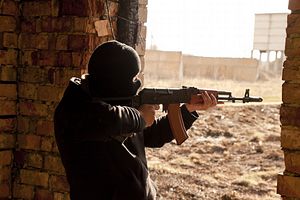Early morning on Monday, June 20, reports in the Iranian media noted that the country had foiled major terror attacks planned by “Takfiri-Wahhabi groups” across Iran during Ramadan. The Ministry of Interior, in a closed door meeting, added that the targets for the foiled attacks were the capital city Tehran, Mahabad in the West Azerbaijan province, and Chabahar in Sistan-Baluchestan province.
Iran’s Supreme National Security Council (SNSC) Secretary Ali Shamkhani disclosed that the Iran has captured several terrorists who plotted bomb attacks. They are currently being interrogated. Two different groups are involved in border clashes and it seems they might be linked to this terror plot: Party for Free Life in Kurdistan (PJAK) in the northwestern province of West Azerbaijan and Jaish-ul-Adl in southeastern Sistan-Baluchestan province. As of now, Iran’s Intelligence Ministry hasn’t divulged any further details.
Jaish-ul-Adl and its predecessor terrorist organization Jundullah were found to have links to Pakistan and Iran had often shelled its hideouts in Pakistan. 5 Iranian soldiers were kidnapped and carried away into Pakistan by Jaish-ul-Adl terrorists in 2014 in an incident that had led to heightened tensions in Iran-Pakistan relations back then. This time, as if on cue to defend itself, Pakistan has accused Iran of breeding terror on its soil after Iran intensified operations on June 13, 2016. The biggest hurdle that can come in the way of the trilateral India-Iran-Afghanistan Chabahar port project is the security of people involved and any terrorist threat can significantly delay the project. Chabahar was targeted in the recent past in a suicide bombing by Jundullah in 2010, soon after the execution of Jundullah leader Abdolmalek Rigi.
Prior to this, Indian national Kulbhushan Yadav was (as per reports) kidnapped inside Iran by drug smugglers and handed over to Pakistan’s spy agency, the Inter-Services Intelligence. The narco-terrorist networks at play here merit additional scrutiny. The daring kidnapping of Yadav just before the visit of Iran’s President Hassan Rouhani and Foreign Minister Javad Zarif to Pakistan showed Islamabad’s uncalled for desperation over the Chabahar port project. Pakistani media meanwhile drummed up the story that Rouhani had discussions on the arrest of “an Indian spy” with Pakistan’s Army Chief Raheel Sharif–reports that were then denied by Rouhani in a press conference.
Moreover, the Taliban continues to cultivate opium in Afghanistan. Opium and opiates like heroin are then smuggled to the sea coast of Pakistan and Iran by various networks of drug smugglers, terrorist organisations like Jaish-ul-Adl, and sometimes with the complicity of Pakistani security forces. Thus, the levers of these narco-terrorist networks lie with Pakistan’s military establishment and presently they seem to be testing what damage they can do to the Chabahar project. If Pakistan intensifies its covert war through proxies, Iran might be forced to take a hard stance that might not be in the best interests of Pakistan.
Aveek Sen is an electrical engineer and journalist.

































